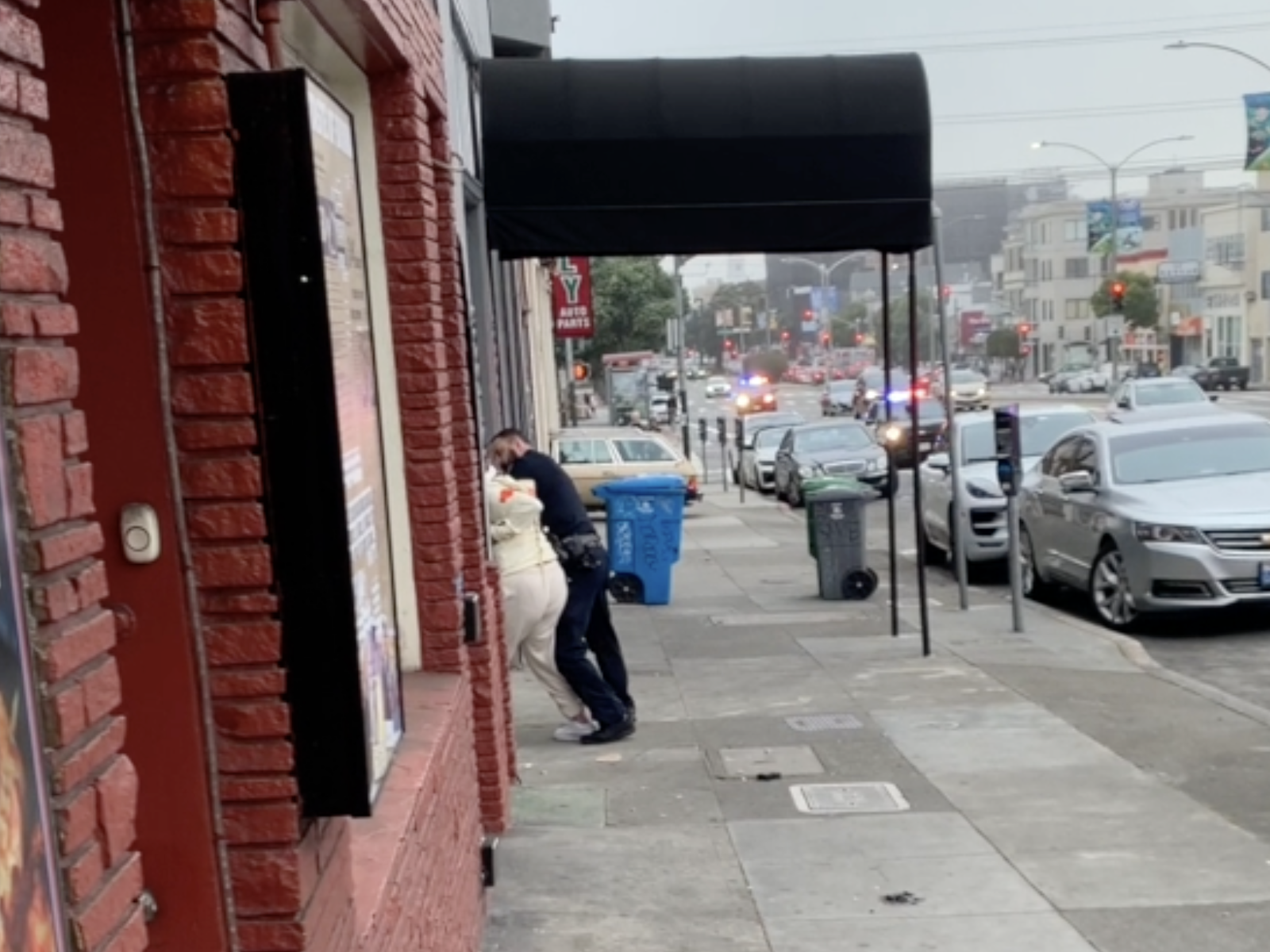[ad_1]
On June 29, Mayor London Breed texted Carla Short, the director of San Francisco Public Works, asking her to send out a crew to pick up trash in the Tenderloin.
“I’m at Azalina’s. Are you around? You should stop by,” read the text from Breed, sent at 5:54 p.m. while the mayor was at a Malaysian restaurant near Ellis and Leavenworth streets. “Can you send someone to clean up across the street please. It [sic] a pile of trash on the south west corner.”
Short said she was at a Giants game but promised to “send someone now.”
“That would be great,” Breed wrote in response. “I want her to succeed but the tents and trash are a problem,” she added, seemingly referencing a homeless woman on the corner. “We will deal with the tents. Thank you and enjoy the game.”
That simple text exchange, which was deleted by Breed from her personal phone but recovered from Short’s device, has revealed a practice within the mayor’s office of routinely deleting text messages and other day-to-day communiques — a practice public records experts say violates California law.
“If Mayor Breed’s texts were about government business and less than two years old, it would be illegal for her to delete them,” said Susan Seager, a First Amendment expert and law professor at UC Irvine who runs the university’s Press Freedom and Transparency initiative. “State law says that public records must be retained for two years. San Francisco is not allowed to nullify state law with its own policies and rules.”
Nevertheless, it has been the policy of San Francisco since 2014 to allow the mayor to delete texts. Half a dozen public records experts said that was a problem, and that the mayor was opening the city up to litigation by deleting texts dealing with official business.
But the mayor’s office sees things differently — and without a lawsuit forcing the matter, it is unclear the practice will change.
Mayor’s texts are ‘non-records’
The mayor’s practice of deleting text messages came to light last month during an Aug. 20 hearing of the Sunshine Ordinance Task Force, the local body responsible for overseeing San Francisco’s public records law.
The task force was considering a complaint filed against the mayor’s office accusing it of failing to respond to a public records request in a timely manner, and then failing to turn over any records at all.
On June 29, a frequent filer of public records requests named Hazel Williams asked for the latest message from Breed on a variety of platforms, like SMS, Signal, and WhatsApp. The mayor, like other city officials, uses her personal phone to conduct city business and speak to staff.
The mayor’s office, after a lengthy delay, wrote on Aug. 8 that it had nothing responsive to the request from Williams. In other words, the mayor had no text messages whatsoever dealing with official city business.
Williams’ requests to other city departments, however, revealed communication between Breed and Public Works, when Public Works responded with the text exchange between its director and Breed.
“I really want to drive this point home: I have text messages sent from the mayor on the day that I asked the mayor’s office for her latest text message,” said Williams. “And yet the mayor’s office says they have no records.”

Hank Heckel, the mayor’s legal compliance officer, wrote in a statement that “Unless such texts have independent legal significance, the individual officials and staff in the Mayor’s Office generally determine whether or not to continue to store individual texts on their phones.”
Breed’s texts, Heckel said at the Aug. 20 hearing, are “typically treated as non-records … in the parlance of record retention policies.”
2014 policy may have always violated California law
Those policies date back to 2014 and Mayor Ed Lee. Since then, San Francisco mayors have abided by local public records retention guidelines that allow for the routine destruction of day-to-day communications that are not defined as “records” under the city’s administrative code.
San Francisco Administrative Code §8 defines records as “paper, book, photograph, film, sound recording, map, drawing or other document … made or received by the department in connection with the transaction of public business.”
Although the code does not specifically include text messages, emails, voicemails, or other routine communications, the mayor’s office has since 2014 interpreted “records” to exclude such communiques, meaning they “may be destroyed when no longer needed,” according to the retention policy.
Five of the six experts who spoke to Mission Local, however, disagreed with this interpretation, saying a practice of deleting texts before two years violates California state law — and that the 2014 policy has likely always violated state law. San Francisco Administrative Code §8.3 notes that “Nothing in this Section shall be deemed to apply to or authorize the destruction of any records that are required to be retained by local, State or federal law.”
“The mayor’s compliance officer is wrong,” said Karl Olson, a 35-year public records attorney. Olson successfully argued a 2017 case in front of the California Supreme Court called City of San Jose v. Superior Court, in which the court ruled that public officials’ messages on personal devices are still public records.
Olson pointed to that City of San Jose decision, in which he represented a resident seeking to obtain texts from a city council member’s private phone. He also noted that California Government Code §34090 separately requires that public records be maintained for a period of at least two years.
“The definition of a public record is anything except the shopping list from home,” he said, pointing to the two-year retention requirement for records. “When you’re texting about public business, then that’s gonna be a public record.”
The San Francisco city attorney’s office declined to comment on the matter.
“San Francisco seems to claim that texts/emails are simply not public records (unless extra, significant circumstances apply), and thus not disclosable,” wrote Brian Hofer, the founder of the Oakland nonprofit Secure Justice and the inaugural chair of Oakland’s privacy commission. “That’s a silly position to take.”
For his part, Heckel also noted that the mayor’s retention policy is similar to that of the Board of Supervisors and other city departments. It is unclear whether other elected officials, like supervisors, also have a practice of routinely deleting messages.
It’s also unclear to what extent Mayor Lee and other mayors deleted their text messages. Williams said she believes Breed’s practice of deleting texts goes back to 2020, when a trove of text messages publicized by Williams showed Breed personally directed staff, including the police chief, to “clear,” “clean,” and “fix” homeless encampments around the city. “After that,” Williams said, “I was unable to get anything from the mayor’s office.”
David Loy, an attorney and the legal director of the First Amendment Coalition, sees more wiggle room for the mayor and San Francisco. He said that while the deletion is a problem and opens the city up to litigation, the definition of “records” under California law is nebulous and has never been adequately defined by state courts.
There is a “hodgepodge of different laws and local rules” that govern retention of records in California, Loy said. “To my knowledge, no court has held that the law requires cities to retain every kind of record under the [California Public Records Act],” he said. “There is some play at the joints here about what the record retention laws are and the obligations of an agency.”
Still, the experts were unanimous that the practice of deleting messages hampers government transparency and keeps the public in the dark about official conduct.
“When you’re a public official — someone dedicated to working and performing your duties in the name of the people — that comes with an obligation to have a light shined upon your activities,” said Gunita Singh, a staff attorney at the Reporters Committee for Freedom of the Press. “There’s no excuse for shielding [records] from the public by way of loose compliance with records retention schedules. The mayor’s office should do better.”
[ad_2]
Source: missionlocal.org






